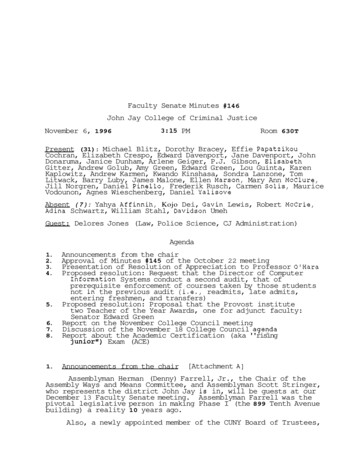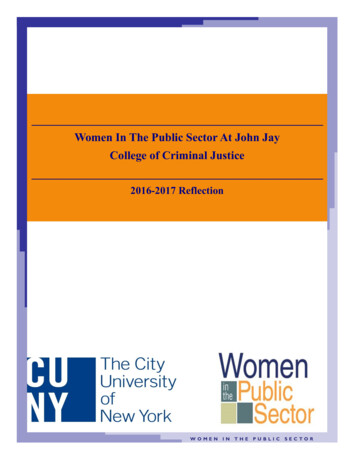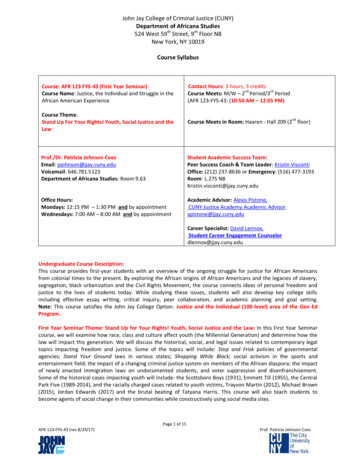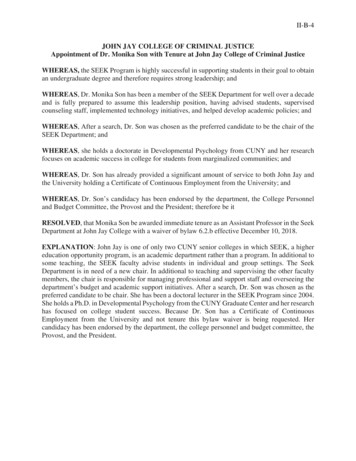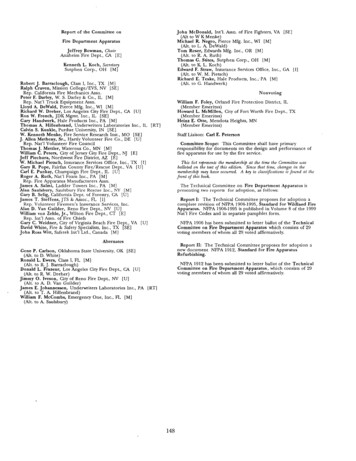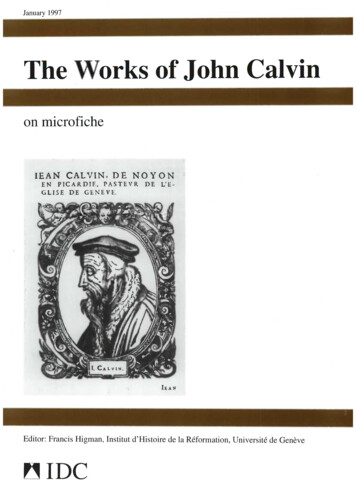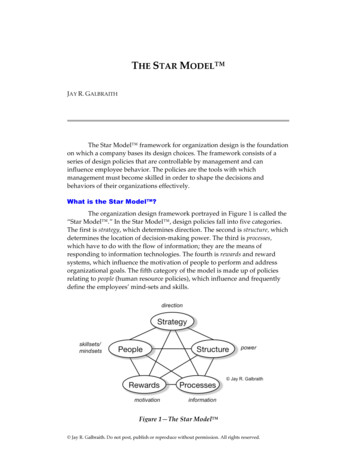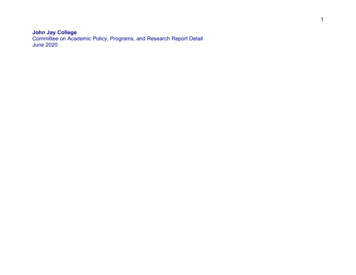
Transcription
1John Jay CollegeCommittee on Academic Policy, Programs, and Research Report DetailJune 2020
2Section AII: Changes in Generic Degree RequirementsAII. 1 Addition of a Policy on Freshman ForgivenessEffective September 1, 2020, the college will implement a Freshman Forgiveness Policy. This policy will apply to all lower freshmanstudents, as defined below, who enrolled at the college in the Spring 2020 term or thereafter. In accordance with this new policy, ifthe student passes the suite of freshman courses, they will receive the grade earned which will carry the designated GPA. If thestudent fails a course, the failing grade (F, WU, FIN) will be administratively converted to “NC – No Credit,” and have no impact onthe GPA. (Restrictions and Limitations apply, see below).The chart below outlines how the Office of the Registrar will treat repeated courses and grades.Original GradeA, B, C, D, P, CR, (incl allplus and minus grades)F, WU, FINGrade ActionNoneEffect on Credits Earned and GPAGrades are factored into GPA and credits are earned.INC, PENAdministratively Changed to “NC-NoCredit” for Lower FreshmenNoneW, WA, WN,NoneGPA will increase due to a grade change from failing toNC. No credits earned for NC coursesConsidered “in progress” grades. If failing grades areultimately assigned, forgiveness rules applyNo effect on GPA – No credits earned for coursesRestrictions1. This policy applies only to a freshman student (attending full-time or part-time) in their first freshman semester,(aka., Lower Freshman).a. A lower freshman is defined as a new student who has not previously matriculated in a college, as a degree-seeking student,prior to their first term of attendance at John Jay.b. A lower freshman is coded by the Office of Admissions as being in the “FRSH” Student Group in CUNYFirst.c. Entering freshman with college credits earned through Regents examination, AP credit, or other exams (i.e., CLEP) are stilleligible for forgiveness under this policy.d. Transfer students, coded as “TRNS,” who enter into the Upper Freshman level or beyond are not eligible for forgivenessunder this policy.2. This policy is effective for lower freshman students enrolled in the college beginning the Spring 2020 term and thereafter. It cannotbe applied retroactively to any semester prior to Spring 2020.3. This policy will not apply to readmitted students who return to the freshman term.a. For this restriction, a readmitted student is considered a student who attended the college and received letter grades.4 This policy applies to matriculated, undergraduate, degree-seeking students. Non-degree students are ineligible for forgivenessunder this policy.
35. For the purpose of this policy, failing grades are considered; “F, WU, FIN.”6. Students who receive grades of “NC” are not eligible for the Dean’s List for that semester or that year for part-time students.7. For the purpose of calculating Latin Honor’s, NC grades will be treated as failing grades.Limitations1. The Freshman Forgiveness Policy only applies to courses taken in the first, lower freshman semester of matriculation. It will notapply to any courses taken thereafter.2. Freshman students enrolled less than Full-Time in the lower freshman semester will be permitted to apply the forgiveness policy tothe first 18 credits earned at John Jay College.3. This policy applies only to courses taken at John Jay College. Courses taken at another college (CUNY or otherwise) are noteligible for forgiveness under this policy.4. Courses with a grade assigned of “NC-No Credit” may negatively impact a student’s financial aid, (i.e., Satisfactory AcademicProgress, Program Pursuit and Credit Accumulation) eligibility. It is strongly recommended that students meet with a financialaid counselor prior to the forgiveness policy being applied.5. A student who repeats a course that has been assigned an NC grade in the prior term will receive a standard letter grade on thesecond attempt.ExplanationAccording to John Jay College’s “Fall 2018 Fact Book,” published by the Office of Institutional Research, the percentage of first-time,full-time, degree-seeking freshmen, still enrolled at the college after the first year is 79.9%. Approximately 20% of the incomingfreshman class is absent after the first year. Performance data after the freshman year reflects that over half of the freshman classattrition is due to a probation/dismissal action. This policy seeks to assist first-time lower freshman students, who are new to thecollege experience, by removing the failing grades that place them in academic /files/u1376/fact book 2018 rev.pdfSee pg. 30 in the Fall 2018 Fact Book.
4Section AIII: Changes in Degree ProgramsAIII.1 The following revisions are proposed for the MPA in Public Policy and AdministrationProgram: MPA in Public Policy and AdministrationProgram Code: 02533Effective: Fall 2020Description of the changes: The MPA program in Public Policy and Administration proposes to remove the Court Administrationconcentration and to clarify language about the impact of waived courses.FromCourseMPA in Public Policy and AdministrationCreditsToCourseMPA in Public Policy and AdministrationCreditsThe MPA Public Policy and Administration program at John JayCollege of Criminal Justice equips future public servants with theknowledge, skills, and leadership experiences necessary for theadvancement of integrity, accountability, inclusiveness, andjustice in society and governance. The program celebrates thediversity of our students, including those underrepresented inthe leadership of public service.The MPA Public Policy and Administration program at John JayCollege of Criminal Justice equips future public servants with theknowledge, skills, and leadership experiences necessary for theadvancement of integrity, accountability, inclusiveness, andjustice in society and governance. The program celebrates thediversity of our students, including those underrepresented in theleadership of public service.Specializations in the program are offered in the followingfields:Specializations in the program are offered in the followingfields: Court AdministrationCriminal Justice Policy and AdministrationEmergency ManagementHuman Resources ManagementLaw and Public ManagementManagement and OperationPublic Policy AnalysisUrban AffairsThis program may also be completed fully online.Degree Requirements Criminal Justice Policy and AdministrationEmergency ManagementHuman Resources ManagementLaw and Public ManagementManagement and OperationPublic Policy AnalysisUrban AffairsThis program may also be completed fully online.Degree Requirements
5Students enrolled in the Master of Public AdministrationProgram in Public Policy and Administration are required tocomplete 42 course credits. Students are also required to passthe MPA qualifying examination (MPAQE), which isadministered as a part of PAD 700. Complete information aboutthe MPAQE is found at the John Jay College m-student-guide.Students enrolled in the Master of Public Administration Programin Public Policy and Administration are required to complete 42course credits. Students are also required to pass the MPAqualifying examination (MPAQE), which is administered as a partof PAD 700. Complete information about the MPAQE is found atthe John Jay College website t-guide.Students are advised to complete PAD 700 and the two othercore foundation courses, PAD 702 and PAD 705, within the first15 credits of matriculation. Failure to complete programrequirements or admission conditions on a timely basis mayresult in a student not being permitted to register for futureclasses without the explicit permission of the program director.Students are advised to complete PAD 700 and the three othercore foundation courses: PAD 702, PAD 705 and PAD 715,within the first 15 credits of matriculation. Failure to completeprogram requirements or admission conditions on a timely basismay result in a student not being permitted to register for futureclasses without the explicit permission of the program director.Additional information. Students, who enroll for the first time atthe College in September 2011 or thereafter, must complete theprogram in the form presented here. Students who enrolled priorto that date and have consistently maintained matriculation, maychoose the form shown here or the version of the program inplace at their time of enrollment.Additional information. Students, who enroll for the first time atthe College in September 2011 or thereafter, must complete theprogram in the form presented here. Students who enrolled priorto that date and have consistently maintained matriculation, maychoose the form shown here or the version of the program inplace at their time of enrollment.Required Courses (21 credits)Required Courses (21 credits)PAD 700 Public AdministrationPAD 702 Human Resources ManagementPAD 704 Economics for Public AdministratorsPAD 705 Organization Theory and ManagementPAD 739 Policy AnalysisPAD 743 Public Sector Financial ManagementPAD 771 Capstone Seminar3333333PAD 704: Students who have completed three courses ineconomics with a grade of B or better at the undergraduate orgraduate level may request a waiver of PAD 704 from theprogram director. A course cannot be used to satisfy both a corecourse requirement and a specialization requirement.PAD 700 Public AdministrationPAD 702 Human Resources ManagementPAD 704 Economics for Public AdministratorsPAD 705 Organization Theory and ManagementPAD 739 Policy AnalysisPAD 743 Public Sector Financial ManagementPAD 771 Capstone SeminarPAD 704: Students who have completed three courses ineconomics with a grade of B or better at the undergraduate levelmay request a waiver of PAD 704 from the program advisor ordirector. If granted, the student must replace the waived courseby taking a 3-credit PAD course.3333333
6Research Methods and Quantitative Skills (6 credits)Research Methods and Quantitative Skills (6 credits)The student must complete a course from each of the followingtwo categories:The student must complete a course from each of the followingtwo categories:Research MethodsResearch MethodsPAD 715 Research Methods in Public Administration3PAD 715 Research Methods in Public Administration3Quantitative Methods and Information ManagementQuantitative Methods and Information ManagementSelect one of the following courses:Select one of the following courses:PAD 713 Management of Information Technology3PAD 745 Program Development and Evaluation3PAD 747/CRJ 747 Computer Applications in Public Policy andManagement3PAD 770 Cases and Techniques in Quantitative Policy Analysis3PAD 713 Management of Information TechnologyPAD 745 Program Development and EvaluationPAD 747/CRJ 747 Computer Applications in Public Policy andManagementPAD 770 Cases and Techniques in Quantitative Policy AnalysisPAD 713, PAD 747, PAD 770: There is no prerequisite for PAD747, PAD 713 or ACC 701. However, computer skills andexperience are assumed for both these courses. Students whoneed additional computer skills will be directed by the programdirector to other places in the College where skills may beobtained. PAD 715 is a prerequisite for PAD 745 and PAD 770.Students with 12 undergraduate credits in computer coursesmay request a waiver of the Quantitative Methods andInformation Management requirement. A student may not use acourse completed to fulfill this section to satisfy requirements inspecialization and elective courses.PAD 713, PAD 747, PAD 770: There is no prerequisite for PAD747 or PAD 713. However, computer skills and experience areassumed for both these courses. Students who need additionalcomputer skills will be directed by the program director to otherplaces in the College where skills may be obtained. PAD 715 is aprerequisite for PAD 745 and PAD 770. Students with 12undergraduate credits in computer courses may request a waiverof the Quantitative Methods and Information Managementrequirement. If granted, the student must replace the waivedcourse by taking a 3-credit PAD course. A student may not use acourse completed to fulfill this section to satisfy requirements inspecialization and elective courses.Specialization (9 credits)Specialization (9 credits)A three-course specialization is required. Students shoulddeclare a specialization upon the completion of 12 credits.Except where otherwise noted, students must complete aspecialization by completing three courses designated for theA three-course specialization is required. Students shoulddeclare a specialization upon the completion of 12 credits. Exceptwhere otherwise noted, students must complete a specializationby completing three courses designated for the specialization3333
7specialization including each course designated as required.PAD 780 (Internship), PAD 755/CRJ 755 (Writing forManagement), and a PAD 800-level course can also be used tocomplete any specialization but may not substitute for a courserequired for the specialization.including each course designated as required. PAD 780(Internship), PAD 755/CRJ 755 (Writing for Management), and aPAD 800-level course can also be used to complete anyspecialization, but may not substitute for a course required for thespecialization.Dual specializations are permissible if the student has fulfilledthe requirements of both specializations. One course can countas an elective for two specializations with approval from theprogram director.Dual specializations are permissible if the student has fulfilled therequirements of both specializations. One course can count as anelective for two specializations with approval from the programdirector.Court AdministrationThis specialization prepares students for responsibilitiesinvolving policy making and administration in the courts.Additional materials on the specialization are available from thespecialization coordinator.Required CoursePAD 760 Court AdministrationElectivesCRJ 735 Prosecuting CrimePAD 710 The Ethical and Legal Environment of PublicEmploymentPAD 713 Management of Information TechnologyPAD 726 The Politics and Process of OutsourcingPAD 741 Administrative Law and RegulationPAD 745 Program Development and EvaluationPAD 758 Ethics, Integrity and AccountabilityPAD 761 Contemporary Issues in Court Administration333333333Students may also fulfill requirements for this specialization with6 credits of law courses in civil and criminal procedures.Criminal Justice Policy and AdministrationCriminal Justice Policy and Administration
8This specialization prepares students for responsibilitiesinvolving policy making and administration in criminal justiceagencies. Additional materials on the specialization are availablefrom the specialization coordinator.This specialization prepares students for responsibilities involvingpolicy making and administration in criminal justice agencies.Additional materials on the specialization are available from thespecialization coordinator.Required CoursesCRJ 730 Policy Analysis in Criminal JusticePAD 719 Delivery Systems in Justice and Urban ServicesSystemsRequired CoursesCRJ 730 Policy Analysis in Criminal JusticePAD 719 Delivery Systems in Justice and Urban ServicesSystems3333CRJ 730: PAD 715 or CRJ 715 is a prerequisite.CRJ 730: PAD 715 or CRJ 715 is a prerequisite.ElectivesCRJ 704 Probation and Parole: Theory and Practice3CRJ 728 Critical Issues in Corrections3CRJ 736 Seminar in Civil Rights and Civil Liberties3CRJ 741 An Economic Analysis of Crime3PAD 750 Security of Information Technology3CRJ 757 Police and the Community3CRJ 761 Youth Crime and Delinquency Control3PMT 711 Introduction to Emergency Management3PMT 781 Risk Analysis and Loss Prevention3PAD 726 The Politics and Process of Outsourcing3PAD 745 Program Development and Evaluation3PAD 758 Ethics, Integrity and Accountability3PAD 760 Court Administration3PAD 770 Cases and Techniques in Quantitative Policy Analysis3ElectivesCRJ 704 Probation and Parole: Theory and PracticeCRJ 728 Critical Issues in CorrectionsCRJ 736 Seminar in Civil Rights and Civil LibertiesCRJ 741 An Economic Analysis of CrimePAD 750 Security of Information TechnologyCRJ 757 Police and the CommunityCRJ 761 Youth Crime and Delinquency ControlPMT 711 Introduction to Emergency ManagementPMT 781 Risk Analysis and Loss PreventionPAD 726 The Politics and Process of OutsourcingPAD 745 Program Development and EvaluationPAD 758 Ethics, Integrity and AccountabilityPAD 760 Court AdministrationPAD 770 Cases and Techniques in Quantitative Policy AnalysisTwo additional courses are to be selected from the above list orfrom any of the specialization courses in the MPA in PublicPolicy and Administration Program, the MPA in Inspection andOversight Program, or from any of the courses listed underspecializations in the Master of Arts in Criminal Justice Program.Two additional courses are to be selected from the above list orfrom any of the specialization courses in the MPA in Public Policyand Administration Program, the MPA in Inspection andOversight Program, or from any of the courses listed underspecializations in the Master of Arts in Criminal Justice Program.Emergency ManagementEmergency ManagementThis specialization prepares students for careers in emergencymanagement. The concentration is designed to emphasizeThis specialization prepares students for careers in emergencymanagement. The concentration is designed to emphasize33333333333333
9technology and business continuity planning, building designissues and terrorism. The specialization has three requiredcourses.technology and business continuity planning, building designissues and terrorism. The specialization has three requiredcourses.Required CoursesPMT 711 Introduction to Emergency ManagementPMT 760 Emergency Management: Mitigation and RecoveryPMT 763 Emergency Management: Preparedness333Required CoursesPMT 711 Introduction to Emergency ManagementPMT 760 Emergency Management: Mitigation and RecoveryPMT 763 Emergency Management: Preparedness333ElectivesPMT 703 Analysis of Building and Fire CodesPMT 712 Theory and Design of Fire Protection SystemsPMT 751 Contemporary Fire Protection IssuesPMT 761 Technology in Emergency ManagementPMT 762 Business Continuity PlanningPMT 781 Risk Analysis and Loss PreventionPAD 726 The Politics and Process of OutsourcingPAD 748 Project ManagementPAD 758 Ethics, Integrity and Accountability333333333ElectivesPMT 703 Analysis of Building and Fire CodesPMT 712 Theory and Design of Fire Protection SystemsPMT 751 Contemporary Fire Protection IssuesPMT 761 Technology in Emergency ManagementPMT 762 Business Continuity PlanningPMT 781 Risk Analysis and Loss PreventionPAD 726 The Politics and Process of OutsourcingPAD 748 Project ManagementPAD 758 Ethics, Integrity and Accountability333333333Human Resources ManagementHuman Resources ManagementThis specialization prepares students to assume supervisoryand administrative responsibilities involving personnelmanagement. The specialization has two required courses.This specialization prepares students to assume supervisory andadministrative responsibilities involving personnel management.The specialization has two required courses.Required CoursesPAD 703 Techniques and Tools of Human ResourcesAdministration3PAD 707 Managing People: A Human Resources Perspective 3Required CoursesPAD 703 Techniques and Tools of Human ResourcesAdministrationPAD 707 Managing People: A Human Resources PerspectiveElectivesPAD 708 Human Resources and Labor in the Public SectorPAD 710 The Ethical and Legal Environment of PublicEmploymentPAD 723 Assessments, Audits and Investigations in HumanResourcesPAD 726 The Politics and Process of OutsourcingElectivesPAD 708 Human Resources and Labor in the Public SectorPAD 710 The Ethical and Legal Environment of PublicEmploymentPAD 723 Assessments, Audits and Investiga
Students enrolled in the Master of Public Administration Program in Public Policy and Administration are required to complete 42 course credits. Students are also required to pass the MPA qualifying examination (MPAQE), which is administered as a part of PAD 700. Complete information about the MPAQE

